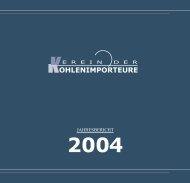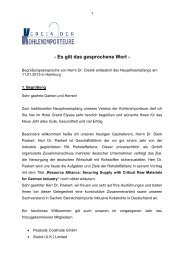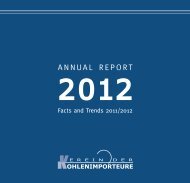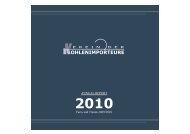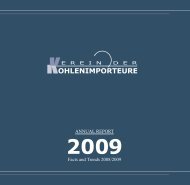Annual Report 2010 - Verein der Kohlenimporteure eV
Annual Report 2010 - Verein der Kohlenimporteure eV
Annual Report 2010 - Verein der Kohlenimporteure eV
Create successful ePaper yourself
Turn your PDF publications into a flip-book with our unique Google optimized e-Paper software.
Requirements of an Energy Policy to 2020 – An Urgent Re-evaluation of Coal<br />
In the opinion of VDKi, policymakers should, on the basis of the most recent experience, further develop and detail<br />
the positions set out in the Energy Concept. This should include a re-evaluation of fossil-fuelled power generation,<br />
<br />
1. A Measured and Realistic Energy Transformation<br />
A U-turn in energy supply choices is wanted politically and socially for reasons of climate protection and is not<br />
questioned. It must, however, remain economically feasible and must not have a negative impact on security of<br />
supply, in or<strong>der</strong> to be successful in the long run. Coal is the supporting pillar of a bridge to a safe, competitive and<br />
environmentally friendly supply of energy.<br />
2. No Risk to Security of Supply<br />
Power must be available reliably 24 hours a day for industry, commerce and households as well as public services. If<br />
it is accepted that renewable energy sources have priority feed-in, then coal must bring security to power generation<br />
today and tomorrow during times when renewables are not available.<br />
With increasing non-dispatched power and priority feed-in, balancing the network will become even more challenging.<br />
According to expert opinion, several thousand kilometres of new extra-high voltage lines are needed by 2020 in<br />
or<strong>der</strong> to transport wind power generated in North Germany to the consumption centres in West and South Germany.<br />
Bearing in mind that today not even 100 km have been constructed and that citizens are protesting against almost all<br />
infrastructure projects, the ambitious schedules of the Fe<strong>der</strong>al Government must be examined and adapted to reality.<br />
3. Curb Subsidy for Green Electricity with a Harmonised European Approach that is Openly Transparent<br />
Shown in the Fe<strong>der</strong>al Budget<br />
An industrial base such as Germany depends on reliable electricity at competitive prices. The costs to promote power<br />
generation from wind, sun and water should therefore no longer be passed through to the power consumer, but should<br />
be openly shown as a subsidy from the fe<strong>der</strong>al budget. Otherwise, the competitivity of Germany as an industrial centre<br />
with competitive energy prices is in serious danger because of the enormous costs of renewable energy sources.<br />
With a functioning EU Emissions Trading Scheme, to protect the climate, the Renewable Energy Sources Act does<br />
not make sense. Furthermore, it appears that wind and solar capacities are developed where they obtain the highest<br />
subsidies and not where the best wind or sun conditions exist. It is all the more important to harmonise renewables<br />
support across the EU in or<strong>der</strong> to deploy renewable energy where it is most economical.<br />
5



